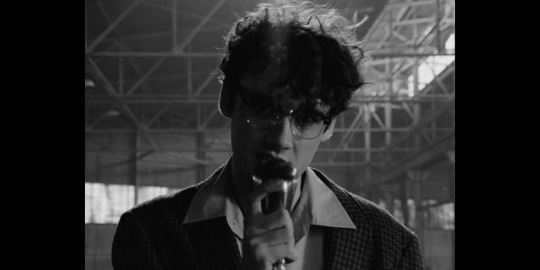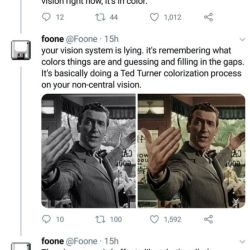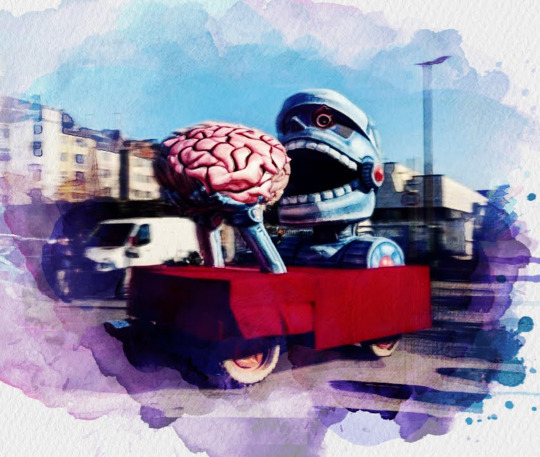#Human Brain
Explore tagged Tumblr posts
Text

A little silly fanart of Lovejoy’s Portrait of a Blank Slate MV directed by Ted Nivison (CHECK OUT HIS VLOG ABOUT IT!!!)
It’s my first time drawing something like that :D
I really wanted to include Mark, Joe and Ash, but they didn’t appear in MV that much, so I didn’t have that many references to work with
I wasn’t very proud of my art lately so it was nice to get out of my comfort zone :D
References from the MV that I used





#wilbur soot fanart#wilbur soot#lovejoy#lovejoy fanart#my art#yokiart#mcyt fanart#human skull#human heart#human skeleton#human brain#lvjy#lvjy fanart#wilbur soot lvjy#will gold#cc!wilbur#cc!wilbur fanart
659 notes
·
View notes
Text
Psychological test that shows how complex and mysterious our minds are. 🤔
#pay attention#educate yourselves#educate yourself#reeducate yourselves#knowledge is power#reeducate yourself#think about it#think for yourselves#think for yourself#do your homework#do some research#do your research#do your own research#ask yourself questions#question everything#government corruption#government lies#government secrets#truth be told#lies exposed#evil lives here#psychology#human brain#our minds#news#humanity#human experimentation#you decide
46 notes
·
View notes
Text

This has probably been transcribed before but I don't know what tags to find it under, so imma just do it again cuz this kind of stuff feels very relevant to know, more evidence that Humans are weird as fuck and our brains just make shit up. [Twitter thread by user named foone as a long image I stumbled upon on Pinterest]: _______________________________
You want to know something about how bullshit our brains are? OK, so there's a physical problem with out eyes: We move them in short fast bursts called "saccades", right? very quick, synchronized movements. The only problem is: they go all blurry and useless during this
Having your vision turn into a blurry mess every time you move your eyes is obviously not a good idea, so our brains hide it from us. Now imagine you're an engineer and you have this problem
You've got some obvious solutions you could do.
make the vision go black during movement. (Some VR games do this!)
just keep showing the last thing we saw prior to movement
Both are good options with different downsides, but OH NO. this is assuming everything makes sense and is chronological and (regular) logical.
Your brain does neither of these options, really.
First, it basically puts your visual system on "pause".
You're not seeing blackness or even nothing, you're just not seeing period.
then when you finish your saccade, it shows you what you now see at the new position. and then it pretends it can time travel.
It seriously shows you the image at the new point, but time-shifts it backwards so that it seems like you were seeing it the whole time your eyes were moving.
And because your brain is not a computer with a consistent clock, this shit works.
You can see this effect happen if you watch an analog clock with a second hand.
Look away (with just your eyes, not your head), then look back to the second hand.
It'll seem like it takes longer than a second to move, then resumes moving as normal.
That's because your freaking visual system just lied to you about HOW LONG TIME IS in order to cover up the physical limitations of those chemical camera orbs you have on the front of your face.
We've known about this effect for over 100 years, it's called "Saccadic masking" and more specifically Chronostasis. Your visual system lies to you about WHEN things happen by up to half a second (!) just to avoid saccades blurring everything.
So while I firmly believe we're basically just overgrown biological computers, we're apparently computers programmed by batshit insane drunkards in Visual Basic 5.
And you might think "hey wait, wouldn't my vision 'pausing' for half a second have all kinds of weird effects on moving objects? why don't they appear to stutter when moving?"
and the answer is simple! your brain has EVEN MORE UGLY HACKS on top of this to avoid you seeing that
If you've got a clock where the second hand doesn't "tick" but instead smoothly rotates, you won't see this. Because your brain recognizes it's moving and adjusts what you see to make sure it sees the "right" thing.
It's only really obvious with periodically moving things like a clock hand, because it's not moving (so not triggering the movement-during-chronostasis hack) but it moves at a set rate, so you can notive that rate appearing to change.
It's tempting to think of your eyes and visual system as a camera just dumping a video feed into your conscious brain but taht's so very, very not the case. What you think you see and what your eyes can actually see are two exceptionally different things.
The big obvious one being the blind spot. Vertebrate eyes are wired backwards so we've got a blind spot in each eye where the enrves enter into the eye. About 6 degrees of your vision in each eye is just not there, as there's no light sensitive cells there.
Do you see a blind spot, right now? No, you probably don't. Close one eye! There's now no way for the other eye to fill in the gaps. Still, no blind spot… Your visual system is lying, and making up content it thinks is there. You literally cannot see what you think you see.
Here's another one: You can see in color, right? (well, some of you can't. Sorry) You can see in color all throughout your vision, it's color everywhere?
Well, most of the cone cells (Which are sensitive to color) are in the fovea, a little spot in the center of your vision.
So outside of that center-of-vision spot, you have very little color perception. There's some but it's very limited compared to your main color vision. But I bet if you shift your attention to your peripheral vision right now, it's in color.
Your vision system is lying. It's remembering what colors things are and guessing and filling in the gaps. It's basically doing a Ted Turner colorization process on your non-central vision.
There's even weird effects like what's called "Action-specific perception". If you get a bunch of white balls of various sizes and toss them at people then ask them to estimate the size of the balls thrown at them, they'll have a certain size estimate, right?
Now repeat the experiment but ask them to try to hit the balls back with a bat, and suddenly all the estimates shift larger. They actually see the ball as bigger because they need to hit it. Their vision is exaggerating it to make it easier to see!
Which just goes to show, like I said, your vision is not a camera. Perfect accuracy is not one of its goals. It does not give any shits about "objective reality", that's not important.
What's important to the evolution of the visual system is any trick that helps you survive, no matter how "dumb" or "weird" it is.
So if you want an accurate visual representation of what things look like? Use a camera. Not your eyes.
In any case the original point was that while you might know this about your eyes being poor cameras that lie to you, you might still think that at least they're consistent, time-wise. They don't screw with your sense of time passing, just to make up for visual defects. NOPE!
If you can't get it don in time, turn back the clock and pretend you did. That's a perfectly good solution when you're the visual system.
BTW @/hierarchon reminded me of a neat trick with saccadic masking: go look in a hand mirror. No matter how close you bring it to your eyes, and how much you look around, you will never see your eyes move. You're blind during those movements. But you still think you are seeing.
She additionally pointed out that your phone's selfie-mode is NOT a mirror, and it has a slight delaye, so you can see your eyes moving in it.
And for fun, here's wikipedia's example of the blindspot. Stare at L with only your left eye, adjust the distance, and the R will disappear. You don't see "nothing" or "black", you see the background, because you expect to.
This is why laser damage your retina can be so insidious. Your visual system already can hide "holes" in your vision, what's one more to hid? So you damage a small spot of your retina and your visual system covers it up.
But since you didn't go "WELL THAT WAS TERRIBLE I BETTER TAKE BETTER CARE OF MY EYES" and stop fucking with lasers, you keep doing it. Eventually you accumulate so much damage that your visual system simply cannot manage hiding it all and your vision rapidly degrades.
The other reason lasers are so dangerous is that they don't necessarily trigger the same responses as regular incoherent light. Your pupil reflex is only triggered by some special cells in the center of your eye, so an off-center laser might not cause your iris to contract.
And infrared laser light is just as dangerous as visible laser light, but can't trigger your blink reflex. Your eyes automatically close when exposed to bright light, but they can't detect infrared light. Despite not seeing it, it still causes damage.
Anyway, back on how amazing and crazy your vision is: There was an experiment back in 1890 where someone wore glasses made with mirrors in them to flip their vision. After about 8 days, they could see just fine with them on. Their vision system had started "flipping" the image.
(I say flipping in quotes because it's not as simple as it started showing the pixels at the top row on the bottom row, cause our vision doesn't work like that) It only took them a few hours to get back to normal after taking these glasses off, though.
The last really fun part about this flipping experiment: your eyes already do it. Based on how our vision is wired, we should be seeing everything upside down.
We don't, but only because our visual system has had a whole life to adapt to this.
BTW, since a few people have brought it up: There's a great sci-fi novel by Peter Watts called Blindsight. In it humans encounter an an alien race they call Scramblers, who can move very fast and precisely, and they exploit saccades.
Because if they only move during saccades, we never see them moving. And since so much of our vision is based on just filling in what we think is there, if they stay out of the direct center of our vision, we'll just visually fill them in, like they were never there.
Check it out if you're into hard SF stories of first contact. It's got some really neat ideas about human vision, very unique aliens, the future of humanity in the face of perfect VR, and vampires. (Really, it has "vampires", while still being hard-SF)
BTW, remember how I said "vertebrate eyes" up there? Guess who has eyes which are wired forwards instead of backwards (have no blindspot), have an internal lens, and can even see polarization of light? Our good friends the Cephalopods!
#long reads#long post#not mine#humans are weird#human biology#human brain#the brain lies#human eyes#vision#sight#science is magic#stupid brain#objective reality#apparently our eyes/brain doesn't care about that thing#what a nuisance
251 notes
·
View notes
Text

30 notes
·
View notes
Photo

Why the Human Brain Has Difficulty Processing Very Large Numbers
13 notes
·
View notes
Text
YOOOOO 2 more fun shirts this morning


I love how the brain turned out! Kinda make me inspired to draw an oc….
Also can’t go wrong with vorhees
164 notes
·
View notes
Text

#esoteric#mystery schools#photon belt#spiritual initiation#theology#spiritual awakening#spiritual journey#self love#higher self#alchemy#human brain#human beings#human race#brainhealth#brain chemistry#consciousness#awareness
16 notes
·
View notes
Text

Hypervigilance
#brain stuff#human brain#eyes#eyestrain#mental state#mental health#dark surreal art#sketchbook#sketches#traditional drawing#dark surrealism#dark art#traditional sketch#my artwork#my drawings#artists on tumblr#illustrators on tumblr#support human artists#might translate this one into a painting
77 notes
·
View notes
Text
You cannot "kill" religion

I want to talk about one thing, that often gets lost.
A while ago I spoke about how even in a Solarpunk world, there would be religious diversity. Which is something I stand by and at least here there was not much in terms of arguments about it. Though I had a lot of arguments about it in other forums. Because... Well, religion is a sore topic for a lot of people. Which I understand. Of course I do. I was abused in the name of religion for most of my childhood and youth. So I get it. I had that time myself. The edgy atheist phase in my 20s, where I would get super angry about anything religious.
But by now I have calmed down a lot about it. I can see that religion is not inherently evil, even though it has been used to justify a lot of evil. And yes, that is true for most of the world religions at least.
It was that, that kept me on the anti-religion train for so long, really. Because being LGBTQ* I obviously am so easily the victim of all the evil justified by religion. But at some point I realized, that literally any frame of mind can be used for evil. Science has been used for lots of evil. And with that I do not just mean that science found ways to do evil, but that it has been used to justify evil. Science has been used to justify racism, sexism and eugenics.
Because the truth is, that humans who want to do evil will just find a tool to justify it.
No, but the thing I want to talk about here is this idea that if people were just all efficiently scientifically literate religion would just die out. Or, alternatively, the idea that we could just forbid religion in any way or form and it would be gone.
When it comes to the first thing, I would say: That is in fact an unscientific claim. To the second I would say: History wants to differ.
Let me make one thing clear: Our human brains are kinda just wired for religion. Our brains have just a couple of traits, that makes it likely for us to become religious or at least supersticious in one way or another.
Like the fact, that we are super wired for seeing someone else's intent. Because we are this super social animal species. But we got so good with this, that our brains kinda just see intent in anything. Like, we will look at those wire connected headphones knotted up and think: "Why are you doing this again?!" While of course the headphones are not intent on this. Because they are just things.
As such we have just a tendency to see a spirit or character in every object. Which is how spiritual believes arrive. Giving each tree, stone and animal some sort of spirit.
It is just what our brains do.
The other thing our brains are kinda hardwired for is pattern recognition. Which leads us to see patterns even if there are none. You hunted a deer and just after that it rained? Twice? Trice even? Oh boy, there is a pattern here. The gods give you rain for sacrificing that deer boy.
Just as we are hardwired to kinda associate "vibes" with objects or places based on what might have happened there. There is absolutely no reason to not live in a place where a murder had happened. But even some of the people who think themselves as super rational will just not... want that.
And we see this going on. While scientists are less likely to be religious than the general populus, there is still a plenthora of religious scientists. Who are not worse scientists because of it. Because here is the other thing: Religion give us something to hold onto.
To believe in a higher power who has a plan for you is soothing to many. Just as it is soothing to believe that dead souls move onto something after death. Both because it helps us deal with the idea of dying one day, but also when it comes to dealing with the death of loved ones.
And that is... okay. Really. In by itself it is okay.
And then there is the history of course. See, I decided to put a Torii up there, because oh boy, the Buddhist folks trying to get the religion to spread in Japan tried a lot to suppress the indigenous believes, that later turned into Shinto. And... Well, they did not manage, did they?
But the same can be said for so many other religions. Be it how the Christians stayed around through Roman persecution. Or how there are still Jewish people, even though they have been persecuted for literal millennia.
Even some of those religions we consider extinct are not really. They have just changed and merged into other religions, that have come along.
I mean, just as the Romans tried to get those Christians to stop being Christians, the Christians in turn tried to extinguish so, so, sooooooo many other religions. But it turns out that a lot of them are still around. At times somehow merged into Christianity. But... They are still there.
And really... I do think hating on religion as a general concept is just a wasted emotional effort. You do not need to believe all of those religious things. But... You will not forbid it. So the constructive thing would be to try and find a way to shift religion in a way, that people who believe it are less likely to fall for people preaching hate. To teach people to be able to read those scriptures in context and be critical of those using it to inspire hate.

79 notes
·
View notes
Text

#robert greene#the daily laws#march 21#quotes#affirmations#citation#motivation#mindset#self confidence#self respect#self improvement#i am getting better#best version of yourself#psychology#psychology tips#life task#the master at work#the universal master#mastery#knowledge#reality#johann wolfgang von goethe#renaissance#human brain#connections#evolution#tumblr fyp#fypage#fyp
4 notes
·
View notes
Text
There is a quote from none other than Alice in Wonderland that goes, "I can't go back to yesterday because I was a different person then," and that got me thinking; isn't that only reason people want to go back and change things? Because they are different people now, and will make different decisions? How amazing is it that people can experience hindsight? How amazing is it that the human brain is ever evolving to the point where we can think of a whole new reality based off of a single decision? How amazing is it that we can become entirely different people after the reading of one novel, or the listening to one story? How amazing is the human brain that can feel regret because it has grown?
#thoughts#thought provoking#my thoughts#alice in wonderland#lewis carroll#shower thoughts#deep thoughts#deep quotes#human#human brain#human behaviour#emotional intelligence#pychology#interesting#regret#hindsight#trash rambles#crack
30 notes
·
View notes
Text
Can you upload a human mind into a computer? A neuroscientist ponders what’s possible
by Dobromir Rahnev, Associate Professor of Psychology at Georgia Institute of Technology

The concept, cool yet maybe a little creepy, is known as mind uploading. Think of it as a way to create a copy of your brain, a transmission of your mind and consciousness into a computer. There you would live digitally, perhaps forever. You’d have an awareness of yourself, you’d retain your memories and still feel like you. But you wouldn’t have a body.
Within that simulated environment, you could do anything you do in real life – eating, driving a car, playing sports. You could also do things impossible in the real world, like walking through walls, flying like a bird or traveling to other planets. The only limit is what science can realistically simulate.
Doable? Theoretically, mind uploading should be possible. Still, you may wonder how it could happen. After all, researchers have barely begun to understand the brain.
Yet science has a track record of turning theoretical possibilities into reality. Just because a concept seems terribly, unimaginably difficult doesn’t mean it’s impossible. Consider that science took humankind to the Moon, sequenced the human genome and eradicated smallpox. Those things too were once considered unlikely.
As a brain scientist who studies perception, I fully expect mind uploading to one day be a reality. But as of today, we’re nowhere close.
Living in a laptop
The brain is often regarded as the most complex object in the known universe. Replicating all that complexity will be extraordinarily difficult.
One requirement: The uploaded brain needs the same inputs it always had. In other words, the external world must be available to it. Even cloistered inside a computer, you would still need a simulation of your senses, a reproduction of the ability to see, hear, smell, touch, feel – as well as move, blink, detect your heart rate, set your circadian rhythm and do thousands of other things.
But why is that? Couldn’t you just exist in a pure mental bubble, inside the computer without sensory input?
Depriving people of their senses, like putting them in total darkness, or in a room without sound, is known as sensory deprivation, and it’s regarded as a form of torture. People who have trouble sensing their bodily signals – thirst, hunger, pain, an itch – often have mental health challenges.
That’s why for mind uploading to work, the simulation of your senses and the digital environment you’re in must be exceptionally accurate. Even minor distortions could have serious mental consequences.
For now, researchers don’t have the computing power, much less the scientific knowledge, to perform such simulations.
youtube
Scanning billions of pinheads
The first task for a successful mind upload: Scanning, then mapping the complete 3D structure of the human brain. This requires the equivalent of an extraordinarily sophisticated MRI machine that could detail the brain in an advanced way. At the moment, scientists are only at the very early stages of brain mapping – which includes the entire brain of a fly and tiny portions of a mouse brain.
In a few decades, a complete map of the human brain may be possible. Yet even capturing the identities of all 86 billion neurons, all smaller than a pinhead, plus their trillions of connections, still isn’t enough. Uploading this information by itself into a computer won’t accomplish much. That’s because each neuron constantly adjusts its functioning, and that has to be modeled, too.
It’s hard to know how many levels down researchers must go to make the simulated brain work. Is it enough to stop at the molecular level? Right now, no one knows.
youtube
2045? 2145? Or later?
Knowing how the brain computes things might provide a shortcut. That would let researchers simulate only the essential parts of the brain, and not all biological idiosyncrasies. It’s easier to manufacture a new car knowing how a car works, compared to attempting to scan and replicate an existing car without any knowledge of its inner workings.
However, this approach requires that scientists figure out how the brain creates thoughts – how collections of thousands to millions of neurons come together to perform the computations that make the human mind come alive. It’s hard to express how very far we are from this.
Here’s another way: Replace the 86 billion real neurons with artificial ones, one at a time. That approach would make mind uploading much easier. Right now, though, scientists can’t replace even a single real neuron with an artificial one.
But keep in mind the pace of technology is accelerating exponentially. It’s reasonable to expect spectacular improvements in computing power and artificial intelligence in the coming decades.
One other thing is certain: Mind uploading will certainly have no problem finding funding. Many billionaires appear glad to part with lots of their money for a shot at living forever.
Although the challenges are enormous and the path forward uncertain, I believe that one day, mind uploading will be a reality. The most optimistic forecasts pinpoint the year 2045, only 20 years from now. Others say the end of this century.
But in my mind, both of these predictions are probably too optimistic. I would be shocked if mind uploading works in the next 100 years. But it might happen in 200 – which means the first person to live forever could be born in your lifetime.
#science#technology#artificial intelligence#robotics#MRI#neuroscience#human brain#brain mapping#chatgpt#Youtube
3 notes
·
View notes
Text
How the hell do you end up throwing someone’s BRAIN in the TRASH???!!!
HOW?!
2 notes
·
View notes
Text

The final Battle (impression of a political caricature float by a true Mastermind of Dusseldorf's Karneval: Jacques Tilly). "Predicting the future isn't magic. It's artificial intelligence." - Dave Waters
#art#political art#caricature#political caricature#karneval#dusseldorf#dusseldorf karneval#jacques tilly#humor#black humor#german humor#quote of the day#quote of today#dave waters#the future#predicting the future#the future now#magic#reality#ai#artifical intelligence#intelligence#intellect#human brain#man vs. machine#bon appetit#hunger#sci fi#utopia#dystopia
5 notes
·
View notes
Text
The Human Brain vs. Supercomputers: The Ultimate Comparison
Are Supercomputers Smarter Than the Human Brain?
This article delves into the intricacies of this comparison, examining the capabilities, strengths, and limitations of both the human brain and supercomputers.

#human brain#science#nature#health and wellness#skill#career#health#supercomputer#artificial intelligence#ai#cognitive abilities#human mind#machine learning#neural network#consciousness#creativity#problem solving#pattern recognition#learning techniques#efficiency#mindset#mind control#mind body connection#brain power#brain training#brain health#brainhealth#brainpower
5 notes
·
View notes
